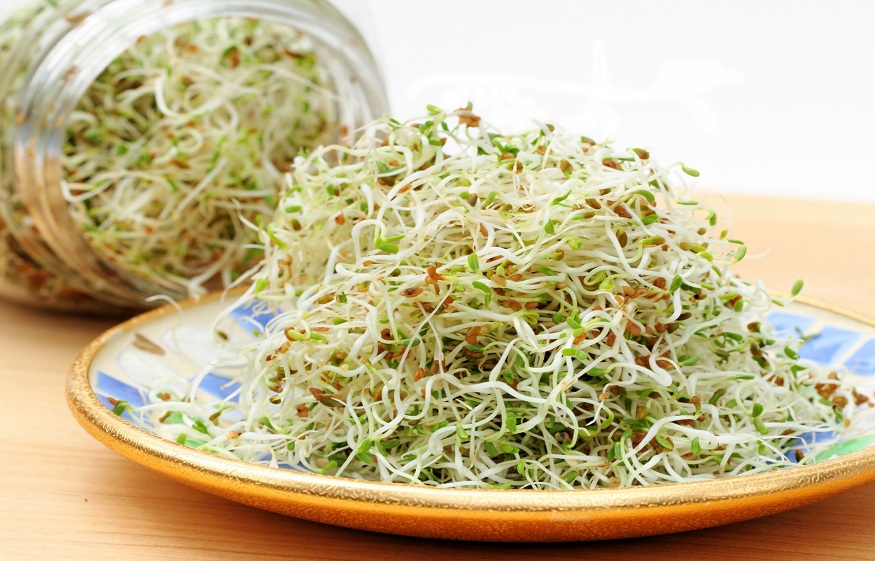
Sprouts – legume seeds, vegetables, or cereal grains – are a healthy food that you can add to your salads or stews. Know what precautions to take to make them at home and eat them safely.
Sprouts: nutritional properties and possible risks
Most supermarkets and grocery stores have included sprouts in their offer, which we see in their cold rooms, on their shelves, and in their freezers, because we can find them in three formats: fresh, canned, and frozen. They can also be done at home, not assuming that this option has a greater risk of bacteria proliferation.
Any legume seed, vegetable, or cereal grain can be germinated: soybeans, lentils, chickpeas, alfalfa, barley, watercress, sunflower, corn, or sesame are some of the most common options. However, not all seeds or grains are valid since nightshade seeds ( eggplant, pepper, tomato, potato) are toxic.
The germination of legumes or seeds is the star experiment in schools. It was for the generation of the 70s and 80s, and it has continued to be for those who came later. Today, the technique – and wisdom – of sprouts has made the leap from school to cooking through the many recipes they can incorporate as an ingredient. Although it is not a culinary novelty because documents show that sprouts’ consumption dates back many centuries, it has gained popularity, uses, and knowledge.
Nutritional properties of sprouts
According to Mario Sánchez, food technologist and author of the well-known blog SefiFood, “sprouts have by definition a higher concentration of fiber, since they come from the whole grain of the food in question, as well as a high concentration of antioxidants and compounds active ingredients such as polyphenols.”
Despite this, Sánchez insists that we should not think of sprouts as a superfood or a product that must be taken to be healthy. “Let’s take into account that they are consumed in small quantities, and therefore it is difficult for them to represent a real benefit for our health,” he says.
Daniel Ursúa, dietician-nutritionist and author of the Nutrihabits blog, shares this premise, who explains to Webconsultas that sprouts are healthy but not a panacea. “They provide absorbing nutrients such as vitamins and minerals, but we must remember that with a varied diet, we have more than enough covered our needs for these nutrients. On the other hand, I do consider that they are interesting from a best nutritional point of view, since they add new flavors and textures to our dishes, allowing us to make them more attractive and varied”.
This expert highlights that dishes as simple as grilled fish can improve, both in appearance and flavor, if we use a few sprouts “which will allow us to add variety to our diet in a straightforward way.” We can use nodes for almost any preparation: salads, creams, stews, vegetables, legumes, toasts and sandwiches, rice, pasta, fish, and meat.
Of course, special care must be taken when it comes to long cooking processes –especially in the case of preparations that require high heat for a long time– so that they do not go limp or fall apart. The ideal is to incorporate them in the last part of cooking to maintain their characteristic texture.
Precautions with the preparation and consumption of sprouts
While sprouts are safe to consume, there are several potential risks when projections are made at home: the heat and humidity that seeds and grains need to germinate are also adequate for the growth of some dangerous bacteria, Salmonella E. coli.
What food safety precautions should we take then to be able to germinate at home? Mario Sánchez responds that it will always have more significant food safety uncertainty than if it were an industrial process like any homemade preparation.
Still, according to the food technologist, there are a series of measures that reduce the risks: “When we germinate, it is advisable to change the sprout water several times to avoid the proliferation of bacteria and other undesirable microorganisms. It is also important to keep the temperature constant as much as possible, around 35ºC. Although they can be cooked, we must think that sprouts are usually eaten raw, so the hygienic measures in handling must be very conscientious”.
If making them at home or purchasing them fresh, they must be kept refrigerated at all times to avoid the proliferation of bacteria. That is why the FDA, the US agency responsible for regulating food and drugs, recommends cooking the sprouts and not consuming them raw. From this organism, they also warn that children, the elderly, pregnant women, and people with weakened immune systems should not eat raw sprouts in any way.

